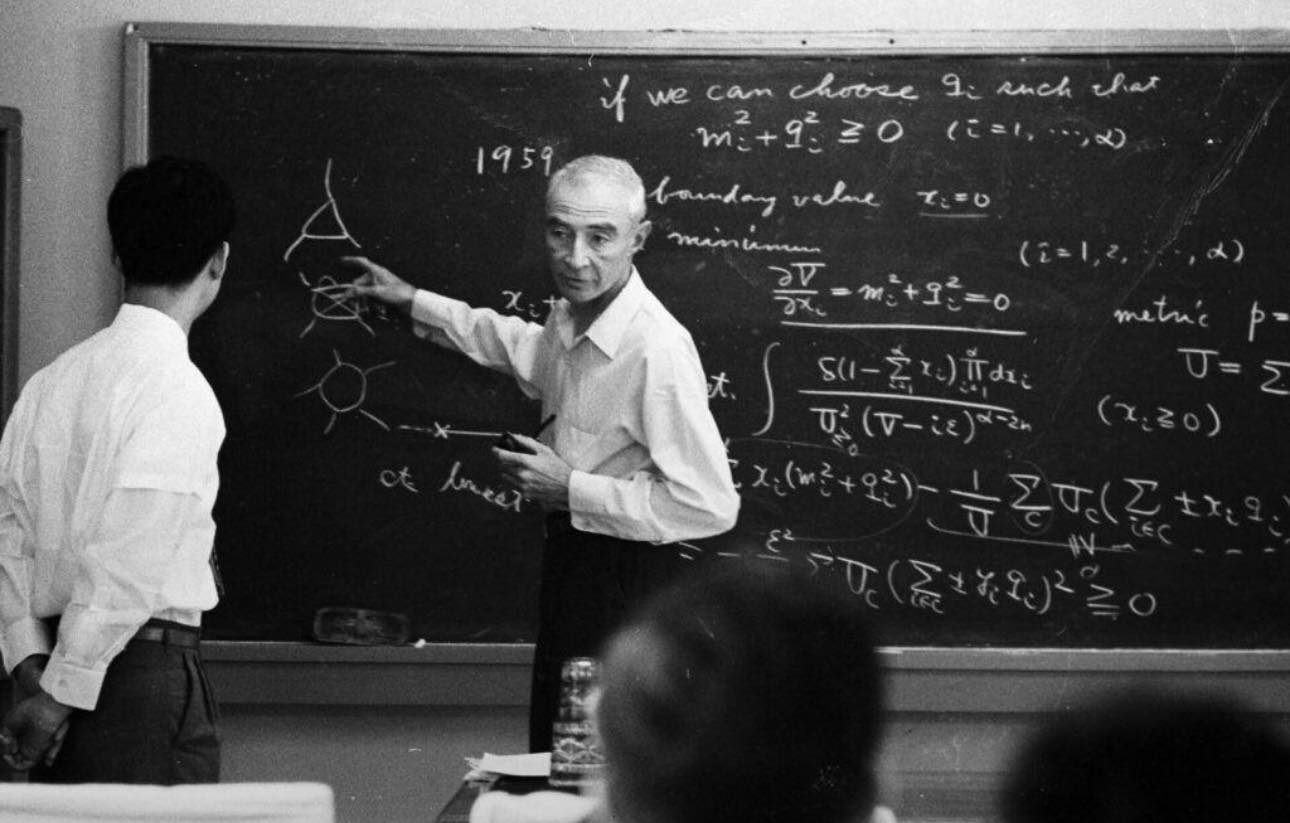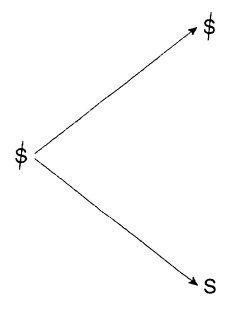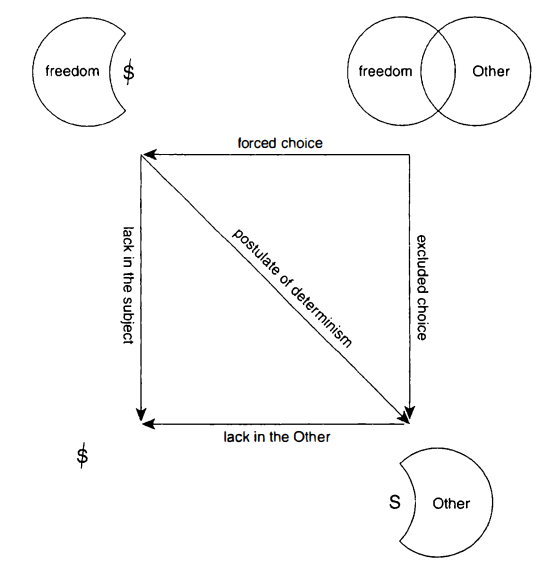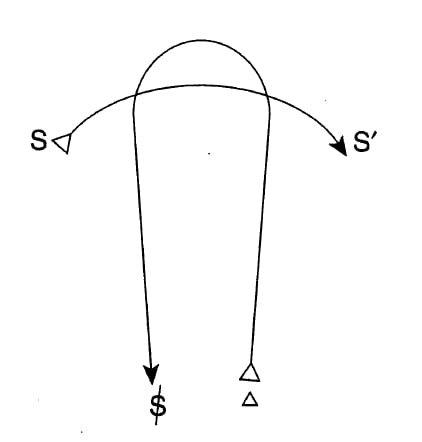
倫理とは不可能な欲望の充足行為
Ethics is the act of satisfying impossible
desires

J. Robert Oppenheimer lectures at
Kyoto University on September 14, 1960 in Kyoto, Japan
☆ 立派になりたいと言う気持ちは病的な衝動である——このことを小学校で教えてくれたらもっと俺は立派になれたはずだ(Joke of the Freudian Kant)
☆ アレンカ・ジュパンチッチ『リアルの倫理:カントとラカン』冨樫剛訳、東京 : 河出書房新社、2003年/ Zupančič, Alenka, Ethics of the real : Kant, Lacan. Verso 2000 Wo es war.
★ 「彼女は、ある無条件の「しなければならない(マスト)」——ポリュネイケスを埋葬しなけれ ばならない——に突き動かされているのである。……しかし、この種の倫理は、カントが切り拓き、ラカンが再び議論 の俎上に載せた領域まで踏み込むことができない。彼らの倫理は、「世のため、人のため」などという心地 よいものではない。彼らの言う倫理的行為は、一般的な意味での「法」や「法からの逸脱」という次元には 存在しないアンティゴネは、暴君によって踏みにじられた人権をとり戻すために戦う社会運動家ではな い。彼らにとっての倫理的行為は、〈真実=ザ・リアル〉の次元にあるのだ」——アレンカ・ジュパンチッチ『リアルの倫理 : カントとラカン』冨樫剛訳, pp.75-76、東京 : 河出書房新社 , 2003.2.
::: 第1章 日常生活の(道徳)精神病理学/ 第2章 「自由」の主体/ 第3章 嘘/ 第4章 逆さの花瓶—不死の魂、そして神/ 第5章 善と悪/ 第6章 悪—文学編/ 第7章 道徳律と超自我/ 第8章 悲劇、そして精神分析の倫理/ 第9章 それゆえ
++
| ジジェク、スラヴォイ「序——なぜカントのた めに戦うのか?」 | ・今日のカント回帰に棹差す(7) ・デカルト的コギト=カントの超越論的主体(7) ・フロイトの脱中心化(的主体)とはなにか(7)→デカルト的コギトであり、かつ、カントの超越論的主体 ・主体の脱中心化とは、自分がつくあげた像に、リアルな実体のほうが模倣してしまい。リアルな中心は、脱中心化してしまっているじょうたい(ミア・ファー ロウの離婚会見するウディ・アレンは、劇中のように振舞うが、そちらのほうが彼の実体を表現するものになってしまったということだ) ・カント=純粋理性批判:「私が純粋に考えるときに、私自身になる。その私の存在は、私の思考の産物ではなくなる」という逆説(9) ・ラカン=カント〈対〉功利主義的倫理/標準キリスト倫理(10) ・功利主義的な思考=第二の自然 ・人間主体は、考えているよりも不道徳であり、かつ、自ら考える不道徳よりも、はるあに道徳的である(10) ・功利主義の倫理は、決して完成することがない(11) ・「功利主義の倫理は決して完成することがない」(S・ジジェク) →未知なる残滓X、つまり、対象 a を必要とする。 ・カントの純粋理性批判は、純粋欲望批判だ(11) ・カントの道徳律は欲望の命法である(11)——カントは、あるものと、その欲望のあいだにはなんの関係もないと考える。それゆえ、カントにとって欲望は 「病的」なものだ。 ・しかし、ラカンは、ある(=経験)ものとは関係なしに、純粋な欲望能力というものがあり、それが対象 a なのだ。 ・対象 a は、デリダによれば、「忘れられた過去の贈与」 ・倫理が、生命のものについて囲い込まれる(→生命倫理学批判) ・帝国主義もまた、被植民地の人々が文明化に浴するようにスロー ガンを掲げるが、実際のところ、そうなって欲しいとは、真には、望まなかった。実現すれば、被植民地の人たちは独立を希求することを、植民者と宗主国政府 は知っていたからである(12) ・現代の学界には「自己破壊への意志」というものがみられる(14) |
| 序章 |
・
カントにおける「病的なもの」→「イマヌエル・カントの哲学において、「病的」とは、理性や道徳原理によってではなく、感覚的な経験や傾向、欲望によって
突き動かされる行動や動機を指す。カントが道徳的法則や義務によって動機づけられた行動を表すのに用いる「実践的」とは正反対である。このように、病的な
行動は外的な原因によって決定されると見なされるのに対し、実践的な行動は意志そのものから生じると見なされる。(Google-AI)→「カントと病的なもの」」 ・カントの至上命令は、フロイトにいわせれば「超自我」(15) ・フロイトが倫理の起源を超自我としたことで、イデオロギーが命じるののが、社会的に名誉ある心の傾向(=倫理)と解釈されることで、倫理概念の相対化が 進む(15) ・ラカン「カントとサド」(→「エクリ」)(16) ・倫理の名前で哲学が提供できるものといえばサドの書名を借りればせいぜい「ベッドルーム(閨房)の実践哲学」にすぎないわけだ(16) ・カント倫理学には倒錯した一面がある=サドの言説には倫理的意義がある(16) ・道徳律は純然たる欲望にすぎない(16) ・純粋な欲望=「精神分析の倫理」の中心テーゼ (16) ・新しい「倫理」(17) ・道徳というのは不可能なことを要求するものだ(17) ・カントは倫理に欲望という次元を導入し、純然たる状態にまで精製した(18) ・本書は真実についての倫理ではなく、ラカンのいう真理を通して倫理を考え直すプロジェクトだ(19) ・ラカンの精神分析の倫理 ・リアルの倫理のプロジェクト(19) ・生命ほど尊いものはない、という倫理を解体する(20)——生命倫理(バイオエシックス)や研究倫理の脱構築をめざす |
| 第1章 日常生活の(道徳)精神病理学 | ・「カントと病的なもの」→生とは、それとは異なるものへの尊敬、この異な
るものの前では、生やその喜びが完全に失われてしまう。生きたいから生きるのではない、それは義務だからだ。これこそが純粋理性の駆動力なのだ(22) ・カント「実践理性批判」 ・カント倫理は禁欲倫理ではない(22) ・快楽原則と倫理の次元のすれ違い(22)→欲望を捨てるのではなく、倫理の王国に入ると、人間はまったく別の生き物になる。欲望など必要なくなる。彼/ 女は全く新しい人間になる(22) ・病的なものと倫理的なもの(23) ・たんなる理性の限界における宗教(25)(→カントの宗教概念) ・カントは低俗な欲望と高尚な欲望の区分をつけることはしなかった(24) ・快楽は経験的であり、それゆえに「病的」である(24)——カントのビジョン ・欲望は欲望であり、低俗なものと高尚なものなどの区別をするのは愚の骨頂だ——カントのビジョン ・倫理哲学と宗教における道徳問題はきちんと区別すべきだ=カントの主張(25) ・実践理性批判と「人倫の形而上学の基礎づけ(道徳形而上学原論)」 ・厳格な道徳法則により「あたらしい人間」になる(25) ・倫理哲学と宗教倫理はことなる。宗教倫理のように経験に依存せず、倫理哲学は「無から創造」される(→「たんなる理性の限界における宗教」) ・行為の名に値する唯一の行為は自殺である(ジャック・ラカン)(26) ・法と道徳の対概念(26) ・行為の倫理的側面(27) ・カント倫理学の課題は、意志から病的なものを取り除き、義務の純粋な形式を取り出すこと(30) ・意志の神聖性は人間には到達できない(31)——それが実現されば「完全善の陳腐さ」ということになる ・倫理は本質的に追加条項である(32) ・ラカン派には、カントの純粋な形式がある。それは、余剰享楽、純粋な余剰、対象 a .だ (32) ・カントは純粋な形式だが、ラカンは、対象=物体としている(33) ・欲望=要求の純形式である(33) ・対象 a .は形式を得た虚空(33) ・主体は病的なものから離れていくが、その際に残滓が残る、この残滓が倫理的主体の動因になる(34) ・これが、実践理性批判をよむ手がかりになる。純粋理性批判もそうだ。人倫の形而上学的基礎づけ、もそうだ(34) ・実践理性の法則=自律性=そしてこれが「自由」というもの(34) |
| 第2章 「自由」の主体 | ・カントの実践理性の主体は分裂した主体である(35)——一方に快楽
を求める主体、他方に、義務を求め病的な情念を否定する主体である。 ・幸福の追求をしてはいけないと言っているのではない、というカントは、義務が問題となるときには、幸福というものを考慮から外せというので、やはり彼は 幸福は二の次なのだ(35) ・自由な行為の特徴は、主体の心的傾向とはまったくなんの関係もない(37) ・行為を左右する動機はすべて病的だ(42) ・人間は彼が信じているよりもずっと不自由だが、同時に彼が知っているよりももっと自由である(43) ・他者の他者は存在しない(ラカン・テーゼ) ・実践理性の主体は、強いられた選択がなされる瞬間に登場する(46)  ・現象としての主体は自由でありえない(カント)(48) ・カントの無からの創造(52) ・根源悪(55) ・私は常に真理を話す(ラカン)(56)  |
| 第3章 嘘(pp.59-) | ・バンジャマン・コンスタン「政治的反動について(1797)」→絶対
に嘘をついてはいけないと主張する「ドイツの哲学者」に反論(59)、中間原理を持ち出す。例外による反論 ・カントの反論(嘘をつく人は、事実を誤認してる)——ジュパンチッチの裁定:論理的にはカントは正しい ・正直であることは至上命令である(66)——カントの主張 ・嘘を是認する論理(68) ・1)状況によっては法を犯すことが許される。2)状況によっては法は適用されない、1と2は根本的にちがう(68-69) ・コンスタンの主張は、人殺しが違法なので、殺人者に嘘を言って友人を救うのは、違法ではない(その通り——違法でないが倫理的には人殺しには不誠実[人 殺しに友人の場所を言うのは倫理的行為])(69) ・カントの道徳善とは(70) ・カントによると義務の履行は無条件(74) ・カントのみならず、倫理遂行に病理的なもの(=人殺しに友人の場所を教える)というものがある(74) ・国法を破って(逆賊)兄ポリュネイケスを埋葬するアンティゴネーは、反倫理的行為であるが、「しなくてはならない行為」に突き動かされる。これが 「ザ・リアル」の倫理的行為である(75-76) ・《サドの罠》(76)——主体は自分が自分の義務と思うことについて責任を負わねばならない ・法の遵守が友人を裏切ると言う享楽を隠してきたことを暴露する(78) ・なぜ本当のことを言えという命令が問題づくめなのか?(78-79) ・主体は普遍的な法の執行者ではなく創造者なのだ(79) |
| 第4章 逆さの花瓶—不死の魂、そして神 | ・弁証法的仮象はなにかの仮象ではない(83) ・パーソンという言葉には仮面の意味がある(86) ・人格は仮象、人格は複数性ある(86) ・しかるに、人格の時間における私という同一性の概念も、両方がその唯一性を保証する(86) ・実践理性の要請:自由、魂の不死、神の存在(93) ・最高善(94) |
| 第5章 善と悪(pp.97-) | ・自殺の論理(101) ・ルイ16世の処刑——国家の自殺(103-104) ・根元悪を考える際の(倫理の名を騙るイデオロギーが召喚する)亡霊(105) ・根元悪を大小でとらえることができない(106)——「たんなる理性の 限界における宗教(解説)」「たんなる理性の限界にお ける宗教(テキスト)」 ・最高善と最高悪の構造的同一性にカントは気づいていなかった/あるいはこれを認めようとしなかった(112) 「「倫理の名を騙るイデオロギー」が「悪」に抵抗するのは、おそらくそれが「善」、すなわち行為の論 理それ自体に対して抵抗しているからである。さらに言おう——現在、社会にあふれている「倫理的ジレン マ」(生命倫理、環境倫理、人種間倫理、医療倫理……)は、まさに倫理が「抑圧」された結果、つまり〈真 実〉の次元における倫理的思考の欠如の結果である。それは、より大きな悪を避けるための一連の規制以上 の倫理、そんな倫理に向かう思考が欠如している結果なのである。このような状況は、「現代社会」のまた 別の一面、すなわち我々の時代に特有の「社会病理」であり、「歴史の終わり」にいる「(ポスト)モダンな 人間」特有の醒めた姿勢を醸し出す「憂鬱」とも関係している」(116) |
| 第6章 悪—文学編 | ・ドン・ジュアン(145-)【→「ドン・ジュアン、またの名を石像の宴」】 ・主人と奴隷の弁証法(149-150) ・〈女性〉は存在しない、というラカンテーゼ(156) ・ジジェクの男性の定義=自分が存在しているという女性——〈女性〉は存在しない、というラカンテーゼを受けて |
| 第7章 道徳律と超自我(pp.163-) | ・ラカンの欲動(168) ・道徳律の超自我化(171) ・崇高の概念——モンティパイソン(172-176) ・道徳的良心(181) ・欲望とはつねに〈他者〉の欲望論(187) ・主体がいなければ〈他者〉も存在しない(190) |
| 第8章 悲劇、そして精神分析の倫理(pp.193-) | ・美学についての講義——悲劇には選択の自由なし(196) ・オイディプス論(199-) ・オイディプスとハムレットの比較論(210-)  シニフィアンの連鎖(S→S') △はキルト縫いして時間を遡り主体($)を形成する(237-238) ・この遡及的意味の決定が、リアルな姿を含めることを成就する ・シーニュ(クローデルの小説の主人公)、またの名を〈残滓の享楽〉(240) ・倫理と脅迫(243)——たしかに、倫理は脅迫とその構造がよく似ている(246) ・ソフィーの選択(243) ・脅迫は、主体化と主体性が破綻する——犠牲を払うように主体を駆り立てることが主体そのものを破壊する(特攻隊志願におけるインフォームドコンセントの強制)(246) ・私が愛さなければならない隣人は、煎じ詰めれば敵(252) ・アラン・バディウ「自称・倫理の使徒たち、異なる権利の伝道師たちは、差異を目の当たりにすると、恐怖を覚える」(255)——バディウ「倫理」原著、24頁 ・享楽=欲望の対象(対象 a)の2つの意味:(1) 〈他者〉の欲望。これは、主体の欲望の原因としての役割を担い、享楽およびその喪失の経験と密接に関係づけられる(たとえば乳房、まなざし、声、糞便、音 素、文字、何でもないようなものなど)。(2) 現実的なものの領域に位置づけられる、象徴化のプロセスの残余。たとえば、論理的な例外やパラドックス、文字や言語のシニフイアン性」 ・カントの言う倫理は、本質的に脅迫の論理である(267)——「あらゆる真実を無効にし、そこから自分自身に戻ろうとするこの虚栄心は、すべての考えを 常 に解消し、内容ではなく、乾いた「私」だけを見つけることができるこの知性に喜びを見出しており、それは、一般性を避け、自己存在だけを追求するため、自 分自身に任せるしかない満足感である」ヘーゲル) ・ラカンのいう〈真実〉は、バディウのいう「出来事」だ(268) ・真実=出来事=脅迫(268) ・カントの極論の問題は、倫理と幸福の関係である(269)——倫理と幸福とはカントは何も関係ないと言いながら、このことを突き詰めると、倫理と幸福は相互に利益を主張しだして、両方の共存は不可能になるというのがジュパンチッチの主張 ・フロイトの無意識における主体の倒錯と欲望の弁証法(1960)(271-272) ・主体の欲望は、耐えられない享楽の染みを拭い去りたいという欲望である(275)=享楽は存在しない/享楽あまねくところにあるの2命題が共存するものとして ・欲望に見切りをつけるとは、自らが持っていないものを与える瞬間である(278) |
| 第9章 それゆえ(pp.281-) | ・ザ・リアルの倫理は、有限者や有限性の倫理ではない(281) ・無限から完全に逃れることができない(281)=無限は有限な世界に、まるで寄生虫のように住みついている(→SF映画における生殖の概念) ・寄生虫の名前が享楽(281) ・我々の存在は死に向かう存在ではない(281) ・ジョーク:我々が享楽に溺れ後者が我々の存在自体を脅かすことがある以上,我々の存在は[常に死を忘れようとする意味で]死に向かう存在ではない(シン_ハイデガー「享楽と時間」) ・死に対する恐怖とは、生に対する恐怖のことだ(282) ・カントの最高善(283)——大切なのは、最高善を目指すのではなく、意思と道徳律を完全に一致させること(284) ・アンティゴネーとその死の意識(284-286) ・欲望の倫理は、「主人の倫理」(286) ・シニフィアンという負債(288)=symboric debt ・君の欲望に見切りをつけてはいけないは、その言葉どおりではなく、なにかひとつのものを手に入れたいのなら、その他のすべてのものに見切りをつけよ、ということ(291) ・欲望のシニフィアン ・アンティゴネーは、φ、ペニスとは区別されるべき欲望のシニフィアンであるファルスを具現する(292)=彼女の崇高な輝き |
☆ アレンカ・ジュパンチッチ
| アレンカ・ジュパンチッチ(Alenka Zupančič
Žerdin、1966年4月1日 - )は、スロベニアの女性哲学者、ラカン派精神分析学者。 1966年リュブリャナ生まれ。1989年にリュブリャナ大学哲学科を卒業し、スロベニア芸術科学アカデミー共同研究員となる。1996年にリュブリャナ 大学文学部のスラヴォイ・ジジェクのもとで博士号を取得し、1997年にはパリ第8大学哲学科のアラン・バディウのもとで博士号を取得する[1][2]。 スロベニア芸術科学アカデミー哲学研究所研究員[3]、European Graduate School(英語版)教授[4]。スラヴォイ・ジジェク、ムラデン・ドラーと共にリュブリャナ精神分析学派(Ljubljana school of psychoanalysis)の有力メンバーの一人である[2]。 精神分析、大陸哲学を研究し、倫理、文学、喜劇、愛などのトピックを論じている。ラカン派のジジェクとドラーに大きく影響を受けたが、カント、ヘーゲル、 ベルクソン、バディウなども参照する。特にニーチェ学者として知られている[4]。 『リアルの倫理――カントとラカン』(2000年)では、カント倫理学やラカンを読み解き、「<真実>の倫理」(ethics of the Real)と称するものを提示した。ジジェクは序文で、「私ともあろう者がこの著者に先を越されるとは! こんなヤツは、本なんか書く前にさっさとくた ばってしまえばよかったのだ!」[5] と賛辞を送っている。哲学者の小泉義之は書評で「本書が現代の最先端に位置する書物であることは間違いがない」と評している[6]。 +++ ラカン「カントとサド」 この文書は、サドとカントの倫理観、欲望、法、そして道徳の関係についての深い考察を提供しています。 サドとカントの倫理観 サドの作品は、欲望と法の関係を探求している。 カントの道徳は、無条件の法則に基づいている。 サドは、欲望の自由を重視し、道徳的制約を批判する。 欲望と法の関係 欲望は、サドの作品において中心的なテーマである。 カントは、道徳的法則が欲望を制御する必要があると主張する。 サドは、欲望の自由を求めるが、法の存在を否定しない。 道徳の再考 サドの視点から見ると、道徳は個人の欲望に対する制約である。 カントの道徳は、普遍的な法則に基づくもので、個人の欲望を超越する。 文書は、道徳の概念が時代とともに変化することを示唆している。 サドの影響 サドの思想は、後の哲学や文学に大きな影響を与えた。 彼の作品は、欲望と権力の関係を探求する重要な資料である。 サドの倫理観は、現代の倫理学においても議論され続けている。 |
|
| Ethics of the Real: Kant and
Lacan, (Verso, 2000). 冨樫剛訳『リアルの倫理――カントとラカン』(河出書房新社, 2003年) Esthétique du désir, éthique de la jouissance, (Théétète, 2002). The Shortest Shadow: Nietzsche's Philosophy of the Two, (MIT Press, 2003). "Ethics and Tragedy in Lacan", The Cambridge Companion to Lacan, (Cambridge University Press, 2003). "The Fifth Condition", Think Again. Alain Badiou and the Future of Philosophy, (Continuum, 2004). Poetika. Druga Knjiga, (Analecta, 2005). Why psychoanalysis? Three interventions, (NSU Press, 2008). The Odd One In: on Comedy, (MIT Press, 2008). |
|
| 1.^ dr. Alenka Zupančič |
Filozofski inštitut ZRC SAZU 2.^ a b Alenka Zupančič Žerdin | MLADINA.si 3.^ prof. dr. Alenka Zupančič Žerdin | Filozofski inštitut 4.^ a b Alenka Zupančič Žerdin - The European Graduate School 5.^ スラヴォイ・ジジェク 「序――なぜカントのために戦うのか?」 『リアルの倫理――カントとラカン』, p.14 6.^ 小泉義之「書評 ジュパンチッチ『リアルの倫理--カントとラカン』--現代思想の閉塞を打破する"本物"」『文學界』57(6), 359-361, 2003-06 |
|
| アレンカ・ジュパンチッチ
『リアルの倫理――カントとラカン』 冨樫剛訳, 河出書房新社, 2003年 小泉義之 「書評 ジュパンチッチ『リアルの倫理--カントとラカン』--現代思想の閉塞を打破する"本物"」『文學界』57(6), 359-361, 2003-06.(リンク先はWord文書) prof. dr. Alenka Zupančič Žerdin | Filozofski inštitut 2016年3月1日閲覧 dr. Alenka Zupančič | Filozofski inštitut ZRC SAZU 2016年3月1日閲覧 Alenka Zupančič Žerdin - The European Graduate School 2016年3月1日閲覧 Alenka Zupančič Žerdin | MLADINA.si 2016年3月1日閲覧 Zupančič Žerdin Alenka - SICRIS 2016年3月1日閲覧 |
|
| ジャック・ラカン スラヴォイ・ジジェク ムラデン・ドラー |
|
| https://x.gd/baYwL |
☆
| Ljubljana
school of psychoanalysis
(Slovene: Ljubljanska psihoanalitska šola or Ljubljanska šola za
psihoanalizo), also known as the Ljubljana Lacanian School[1] (Slovene:
Ljubljanska lakanovska šola), is a popular name for a school of thought
centred on the Society for Theoretical Psychoanalysis based in
Ljubljana, Slovenia. Philosophers related to School include Rastko
Močnik, Slavoj Žižek, Mladen Dolar, Alenka Zupančič, Miran Božovič and
Eva Bahovec. Other scholars associated with the school include
philosophers Simon Hajdini [sl], Zdravko Kobe, Rado Riha, Jelica Šumič
Riha, sociologist Renata Salecl and philosopher Peter Klepec [sl]. |
リュブリャナ精神分析学校(スロベニア語:Ljubljanska
psihoanalitska šola または Ljubljanska šola za
psihoanalizo)は、リュブリャナ・ラカン派学校[1](スロベニア語:Ljubljanska lakanovska
šola)としても知られる、スロベニアのリュブリャナを拠点とする理論精神分析協会を中心とした思想派の通称だ。この学派に関連する哲学者には、ラスト
コ・モチニク、スラヴォイ・ジジェク、ムラデン・ドラル、アレンカ・ズパンチッチ、ミラン・ボゾヴィッチ、エヴァ・バホヴェツなどがいる。この学派に関連
する他の学者には、哲学者サイモン・ハイディニ
[sl]、ズドラヴコ・コベ、ラド・リハ、イェリカ・シュミッチ・リハ、社会学者レナータ・サレクル、哲学者ピーター・クレペック [sl]
などがいる。 |
| Historical background The school was founded in the late 1970s by young Slovenian followers of the theories of the French psychoanalyst Jacques Lacan, in what was then the Socialist Federal Republic of Yugoslavia. Founding members of the school included Rastko Močnik, Slavoj Žižek and Mladen Dolar. Their main aim was to bring together the philosophy of German idealism, Marxism and psychoanalytic theories as a means of analysis of contemporary social, cultural and political phenomena. The school rose to prominence in the international academic environment in the 1990s. Members of the school did not practice psychoanalysis on patients. The group was formed around a young generation of Marxist students at the University of Ljubljana, in Socialist Slovenia. Contrary to their older colleagues, affiliated with the Praxis school, these young students rejected Marxist humanism and turned towards the "antihumanism" of the French Marxist philosopher Louis Althusser and, to a lesser extent, to the Frankfurt School. The main goal of the Ljubljana School was to re-interpret Marxism by emphasizing the rootedness of Karl Marx's thought in the tradition of German idealism. They favoured an anti-historicist interpretation of Hegel's philosophy, with an emphasis on his epistemology and dialectic philosophy. Most of the members of the Ljubljana school have been indebted to the Slovenian Marxist Božidar Debenjak, professor of philosophy at the University of Ljubljana, renowned for his attentive reading of German idealism, who introduced the Frankfurt School in Slovenia. A specific feature of the Ljubljana School was to connect the Marxist and Hegelian traditions with Lacanian psychoanalysis and with Structuralism. The combined reading of Lacan, German idealism (especially Hegel), Marx, the Frankfurt school and authors from the structuralist tradition, especially Claude Lévi-Strauss, has since been the distinctive feature of the Ljubljana School. |
歴史的背景 この学校は、1970年代後半、当時ユーゴスラビア社会主義連邦共和国であった国で、フランスの精神分析学者ジャック・ラカン(Jacques Lacan)の理論を信奉するスロベニアの若者たちによって設立された。学校の創設メンバーには、ラストコ・モチニク(Rastko Močnik)、スラヴォイ・ジジェク(Slavoj Žižek)、ムラデン・ドラル(Mladen Dolar)などがいた。彼らの主な目的は、ドイツ観念論、マルクス主義、精神分析理論を統合し、現代社会、文化、政治現象を分析する手段として活用する ことだった。この学校は1990年代に国際的な学術界で注目を集めるようになった。この学校のメンバーは、患者に対して精神分析を行わなかった。 このグループは、社会主義スロベニアのリュブリャナ大学に在籍する若い世代のマルクス主義学生たちを中心に結成された。プラクシス学派に所属する年長の同 僚たちとは対照的に、これらの若い学生たちはマルクス主義的人間主義を拒否し、フランスのマルクス主義哲学者ルイ・アルチュセール、そしてより限定的には フランクフルト学派の「反人間主義」に傾倒した。 リュブリャナ学派の主な目標は、カール・マルクスの思想がドイツ観念論の伝統に根ざしていることを強調することで、マルクス主義を再解釈することだった。 彼らはヘーゲルの哲学を反歴史主義的に解釈し、その認識論と弁証法哲学に重点を置いた。リュブリャナ学派のほとんどのメンバーは、リュブリャナ大学哲学教 授でドイツ観念論の精緻な読解で知られるスロベニアのマルクス主義者ボジダル・デベニャクに多大な影響を受けている。彼はスロベニアにフランクフルト学派 を導入した人物でもある。 リュブリャナ学派の特筆すべき特徴は、マルクス主義とヘーゲル主義の伝統をラカン派の精神分析と構造主義と結びつけたことだ。ラカン、ドイツ観念論(特に ヘーゲル)、マルクス、フランクフルト学派、そして構造主義の伝統に属する著者(特にクロード・レヴィ=ストロース)の複合的な読解は、以来、リュブリャ ナ学派の特異な特徴となっている。 |
| Theoretical work The Ljubljana School of Psychoanalysis focuses on the following areas:[2] readings of modern and classical philosophy (especially German idealism) through the theory of Jacques Lacan; elaboration of Lacanian theories of ideology and power (both of the Communist regime in the 1980s and the liberal democracy after 1990); analysis of culture and art, with a special emphasis on cinema. |
理論的研究 リュブリャナ精神分析学派は、以下の分野に焦点を当てている[2]。 ジャック・ラカン理論による現代および古典哲学(特にドイツ観念論)の解釈 ラカンによるイデオロギーと権力に関する理論の精緻化(1980年代の共産主義体制と1990年以降の自由民主主義の両方について) 文化と芸術の分析、特に映画に重点を置いている。 |
| Institutional frame The school first emerged in the late 1970s as a distinct intellectual group within the alternative journal Problemi. Since the mid-1960s, this journal served as the only alternative media in Slovenia where critical and dissenting opinions against the mainstream Titoist ideology could be heard. The journal thus hosted an extremely wide range of contributors, from apolitical modernist literates, civic nationalists, conservatives, liberals, social democrats up to radical Marxists, Lacanians and followers of the Frankfurt school. By the early 1980s, the tensions within the editorial board reached their height, causing the more conservative and non-Marxist contributors to publicly petition the authorities of the Socialist Republic of Slovenia to be allowed to establish their own journal. Their demands were accepted in 1981, where a new alternative journal, the Nova revija, was founded. From then on, the followers of the Ljubljana School gradually took over the journal Problemi, transforming it into the main platform of their intellectual activities. In 1985, the journal Problemi launched the Analecta book series, publishing more than 60 monographs since, mostly translations of classical and contemporary philosophers (e.g. Spinoza, Hume, Hegel, Kant, Derrida, Lyotard and Badiou), as well as Slovene authors. In the late 1980s, the Society for Theoretical Psychoanalysis was founded as the central coordinating body of publishing and editorial activities of the group. The current president of the society is Slavoj Žižek. Nevertheless, the academic activity has mostly been taking place within the University of Ljubljana and the various institutes and departments associated to it (such as the Faculty of Arts and the Institute for Sociology) and the Scientific Research Centre of the Slovenian Academy of Sciences and Arts. |
制度的枠組み この学校は、1970年代後半、オルタナティブ誌『Problemi』の中で、独自の知的集団として誕生した。1960年代半ば以降、この雑誌は、主流の ティト主義イデオロギーに対する批判的・反対的な意見が聞かれる、スロベニアで唯一のオルタナティブメディアとしての役割を果たしていた。そのため、この 雑誌には、政治に関心の低いモダニストの文学者、市民ナショナリスト、保守派、リベラル派、社会民主党員から、過激なマルクス主義者、ラカン派、フランク フルト学派の信奉者まで、非常に幅広い寄稿者が集まった。1980年代初頭、編集委員会内の緊張は最高潮に達し、より保守的で非マルクス主義的な寄稿者た ちは、スロベニア社会主義共和国当局に対して、独自の雑誌の創刊を許可するよう公に請願した。彼らの要求は1981年に受け入れられ、新たな代替誌『ノ ヴァ・レヴィジャ』が設立された。以降、リュブリャナ学派の支持者は徐々に『プロブレミ』誌を掌握し、その知的活動の主要なプラットフォームへと変貌させ た。 1985年、『プロブレミ』は『アナレクタ』書シリーズを創刊し、以来60冊を超える単行本を出版してきた。その大半は古典的・現代的な哲学者(例: スピノザ、ヒューム、ヘーゲル、カント、デリダ、リオタール、バディウ)やスロベニア人作家の著作の翻訳が掲載されている。1980年代後半、このグルー プの出版および編集活動の中心的な調整機関として、理論的精神分析協会が設立された。同協会の現在の会長は、スラヴォイ・ジジェクである。 ただし、学術活動は主にリュブリャナ大学およびその関連機関(芸術学部、社会学研究所など)ならびにスロベニア科学芸術アカデミーの科学研究センターにお いて行われている。 |
| Controversy The popular name of "Ljubljana School of Psychoanalysis" is seen as problematic by some, since none of its members is a practicing psychoanalyst. The issue was raised by The Slovenian Society For Lacanian Psychoanalysis in 2015. The Slovene Society for Theoretical Analysis, around which the popular name is centered, responded that its work is "focused on intersections and encounters between philosophy and psychoanalysis. It has never pretended to deal with anything else but the theoretical psychoanalysis, and this entails no conflict with psychoanalytic practice nor has anyone ever maintained that the one would be a replacement for the other."[3] In 2016 the Slovenian Lacanian psychoanalyst Nina Krajnik launched an international initiative with the claim that Ljubljana School tried to prevent the presence of the Lacanian psychoanalysis in Slovenia and that several academic articles of the members of Ljubljana School are based on plagiarism.[4][5][6] |
論争 「リュブリャナ精神分析学派」という通称は、そのメンバーに実践的な精神分析医が一人もいないことから、一部で問題視されている。この問題は、2015年 にスロベニア・ラカン精神分析学会によって提起された。 この通称の中心となっているスロベニア理論分析協会は、その活動は「哲学と精神分析の交差点や出会いに焦点を当てたもの」であり、「理論的精神分析以外の 分野を扱うことを主張したことはなく、精神分析の実践と矛盾するものでもない。また、どちらかが他方を置き換えるという主張をした者もいない」と回答し た。[3] 2016年、スロベニアのラカン派精神分析家ニナ・クラニクは、リュブリャナ学派がスロベニアにおけるラカン派精神分析の存在を妨害しようとしたと主張 し、リュブリャナ学派のメンバーの複数の学術論文が剽窃に基づいていると主張する国際的なイニシアチブを立ち上げました。[4][5][6] |
| Debates Members of the Slovenian School of Psychoanalysis have engaged in a number of high profile debates. Slavoj Zizek engaged in a noted debate with the University of Toronto Psychology Professor Jordan Peterson in Canada about happiness and communism.[7] Slavoj Zizek and Alenka Zupancic have also engaged in friendly debates with the Canadian sociologist Duane Rousselle about limitations to the Slovenian School paradigm. Rousselle argues for a paradigm shift which restitutes the presuppositions of the Slovenian School into a different register.[8] Through this approach, Rousselle inaugurated the Neo-Slovenian School which also includes the theological work of Mark Gerard Murphy. |
議論 スロベニア精神分析学派のメンバーは、数多くの注目すべき議論を展開してきた。スラヴォイ・ジジェクは、カナダのトロント大学心理学教授ジョーダン・ピー ターソンと、幸福と共産主義について議論を交わした。[7] スラヴォイ・ジジェクとアレンカ・ズパンチッチは、スロベニア学派のパラダイムの限界について、カナダの社会学者デュアン・ルッセルとも友好的な討論を 行っている。ルッセルは、スロベニア学派の前提を別の次元で再構築するパラダイムシフトを主張している[8]。このアプローチを通じて、ルッセルは、マー ク・ジェラルド・マーフィーの神学的研究も取り入れた新スロベニア学派を創設した。 |
| Continental philosophy Critical theory Post-Marxism |
大陸哲学 批判理論 ポストマルクス主義 |
| 1. "Newsletter" (PDF).
washington.embassy.si. 1 March 2007. Archived from the original (PDF)
on 1 September 2011. 2. Elisabeth & Edmond Wright, eds., The Žićek Reader (Blackewell Publishing, 1998), 1-2 3. "Knjižna zbirka Analecta in revija Problemi". drustvo-dtp.si. Archived from the original on 23 February 2017. Retrieved 19 December 2017. 4. "Movement". Slovensko društvo za lacanovsko psihoanalizo. Retrieved 7 May 2024. 5. "International appeal". Slovensko društvo za lacanovsko psihoanalizo (in Slovenian). 14 January 2018. Retrieved 7 May 2024. 6. Krajnik, Nina. "Žižek, the fraud" (PDF). lacanquotidien.fr/blog/. Archived from the original on 22 October 2017. Retrieved 19 December 2017. 7. "Peterson–Žižek debate". 9 April 2023. Retrieved 17 April 2023 – via Wikipedia. 8. "Rousselle's Ongoing Debate with Slavoj Zizek". 3 December 2022. Retrieved 3 December 2022. |
1.
「ニュースレター」(PDF)。washington.embassy.si。2007年3月1日。2011年9月1日にオリジナル(PDF)からアーカ
イブ。 2. Elisabeth & Edmond Wright 編、『The Žićek Reader』(Blackewell Publishing、1998年)、1-2 3. 「Knjižna zbirka Analecta in revija Problemi」。drustvo-dtp.si。2017年2月23日にオリジナルからアーカイブ。2017年12月19日に取得。 4. 「Movement」。Slovensko društvo za lacanovsko psihoanalizo。2024年5月7日に取得。 5. 「国際アピール」。スロベニア・ラカン精神分析協会(スロベニア語)。2018年1月14日。2024年5月7日に閲覧。 6. Krajnik, Nina. 「Žižek, the fraud」 (PDF). lacanquotidien.fr/blog/. 2017年10月22日にオリジナルからアーカイブ。2017年12月19日取得。 7. 「ピーターソンとジジェクの討論」。2023年4月9日。2023年4月17日取得 – ウィキペディア経由。 8. 「ルセルとスラヴォイ・ジジェクの継続的な討論」。2022年12月3日。2022年12月3日取得。 |
| Website of the Society for Theoretical
Psychoanalysis, Ljubljana |
|
| https://en.wikipedia.org/wiki/Ljubljana_school_of_psychoanalysis |
☆カエルとサソリ
「あ る時、サソリが川を渡ろうとして、カエルに渡してくれるよう頼んだ。カエルは『だめだ。君を背負ったところで僕は君に刺されて死んでしまう』と断った。サ ソリは言い返す。『何て理屈の通らない言い草だ。君が死んだら、俺まで溺れてしまうだろう』そう言われてカエルは納得し、サソリを背負って川を渡り始め た。ところが川の真ん中で、カエルは背中に痛みを感じ刺されたことを知った。『理屈だって!』サソリと共に沈みながら、カエルは叫ぶ。『理屈も何もない じゃないか!』するとサソリは言った。『分かってはいるけれどやめられない。それが俺の性(さが)なんだ…』」※この挿話は、オーソン・ウェルズの映画 『ミスター・アーカディン』(1955)からの引用
リ ンク
文 献
そ の他の情報
CC
Copyleft, CC, Mitzub'ixi Quq Chi'j, 1996-2099
☆
 ☆
☆